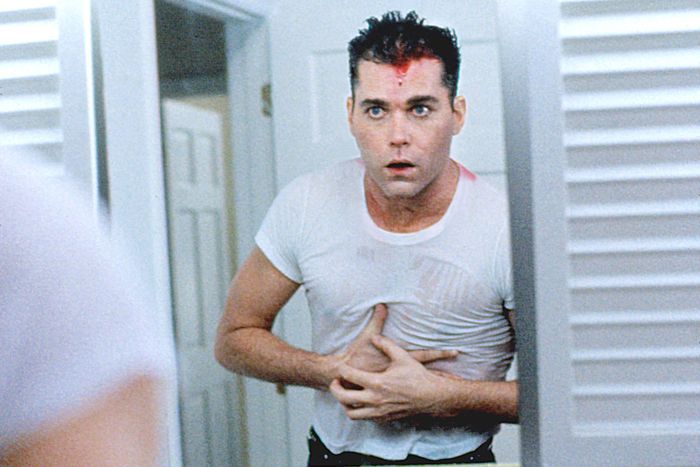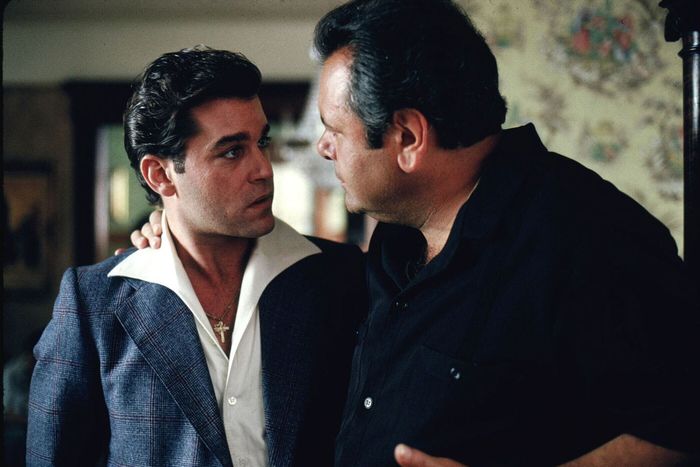
For Ray Liotta, being an actor was better than being president of the United States, but if there was a secret to why he was so good at it, he kept it to himself. Like a studio player in the old days, he spoke to journalists about why he accepted or passed on a role (usually for career, financial, or scheduling reasons) and sometimes whether he regretted making a certain choice (for instance, David Chase wanted him as Ralphie Cifaretto, one of Tony Soprano’s most fearsome antagonists, and he said no). But the actual acting part: About that, Liotta didn’t have much to say.
You can see the tendency in one of his earliest promotional interviews, for 1986’s Something Wild. A local TV host starts by calling out one of the actor’s press-release quotes, in which Liotta insisted that his character, Ray Sinclair, an ex-con with a penchant for assault, isn’t a bad guy. The interviewer asks if Liotta was drinking when he made the statement, insisting the character is one of the scariest bad guys he’s ever seen. Liotta counters, “You know, you can’t go into anything thinking you’re gonna play a bad guy.” When the interviewer proceeds to ask Liotta what he thinks the movie is “about,” then, Liotta offers not an overview of its themes or message but an outline of the plot.
Liotta, who died last week at 67, never took the easy route to a feeling, but he didn’t overcomplicate things, either. There were little surprises in all of his scenes: He’d make you laugh when you expected to be scared, scare you when you expected to laugh, or do something with his voice, face, or shoulders that made you shed a tear for a character who seemed to have no redeeming qualities. But he wasn’t fussy or self-regarding. No matter how big or small his performances got — and almost nobody was better at dialing it up and down — you never felt Liotta was just amusing himself.
Best known as the star of Martin Scorsese’s classic Goodfellas — a two-and-a-half-hour film that he carried on his back and that is as much associated with his face as Psycho is with Janet Leigh’s — Liotta was a workhorse actor. He made you believe everything he did, no matter how absurd it might have seemed on paper. He made you feel he was just doing whatever his guy would do in that situation, whether playing a mobster (in 1990’s Goodfellas and too many other films to count), a brutal criminal (Something Wild et al.), a fallen cop (2002’s Narc, 1997’s Copland), a widowed single father easing into an interracial romance in the 1950s (1994’s Corrina, Corrina), a divorce lawyer willing to get his hands dirty to help his client (2019’s Marriage Story), a medical student caring for a developmentally disabled brother while struggling to manage his anger at their childhood abuse (1988’s Dominick and Eugene), the ghost of “Shoeless Joe” Jackson returned to Iowa to play baseball in a cornfield (1989’s Field of Dreams), or a serial killer holding a planeload of passengers hostage during a thunderstorm (1997’s Turbulence).
He was an offbeat leading man for maybe 15 years — roughly from his big-screen debut in Something Wild through the thriller Narc — but the roles were spotty, and you could tell some of the scripts had other actors’ coffee stains on them. He got hired as a supporting player before, during, and after that brief golden window. Once it became clear that he would never be a matinee idol (even his 1980s East Coast tough-guy contemporary Mickey Rourke, an almost equally unlikely candidate for ’80s movie stardom, got closer to the brass ring), Liotta remained in demand as a villain and cameo player, often in crime and suspense pictures, the genres that put him on the map.
But he could do comedies, romances, and straight dramas as well, and when they came his way, he was superb in them. Even when the material let Liotta down, he never let the audience down. He was less an exemplar of the Marlon Brando–Jack Nicholson–Al Pacino intellectualized male movie star than one of those charismatic but unpretty leading men with an edge who used to anchor films in earlier decades: actors like Lee Marvin, Humphrey Bogart, Glenn Ford, Paul Muni, and John Garfield (whom the young Liotta faintly resembled). You could imagine him under contract to a studio in the 1940s — probably Warner Bros., which was known for its genre films — moving from project to project, wisecracking and snarling and suffering, tracing the air with a lit cigarette.
Liotta had a dancer’s body, a lush head of hair, and piercing blue eyes with thick lashes that imbued his close-ups with a feminized aspect of suffering you didn’t expect to see in the sorts of films he often ended up in. But these aspects were counterbalanced by a scary-clown grin, acne scars, deep lines around the mouth, and a braying laugh that could signal boyish glee or impending murder. Liotta could never be labeled a pretty boy — which is why the scene in the 1996 neo-noir Unforgettable where a villain calls him “pretty boy” makes you realize the role was written for someone else. Even when the movies put Liotta in a suit, he never seemed glamorous or dreamy. He was that character, in a suit. But he was beautiful. The beauty came from the laser-focused artistry he brought to every assignment, no matter how noble or absurd. He wasn’t a talker or a thinker. He was a doer. He took the part, he read the script, he nailed the performance, and he moved on to the next thing.
Liotta didn’t come from money, and he wasn’t a Hollywood legacy or a trust-fund kid whose safety net allowed him to keep failing until he succeeded. He was born in Newark, New Jersey, abandoned at an orphanage as a child, and raised in nearby Union by a township clerk and an auto-parts-store owner. His lineage was listed as half Italian, half Irish, just like Henry Hill’s in Goodfellas. But those were the ethnicities of his adoptive parents. He never actually knew what he was. He was a man without identity or allegiance, other than to the people who loved him — the perfect starting place from which to earn a living pretending to be other people. The way Karen Hill (Lorraine Bracco) describes Henry could double as a description of Liotta: “Our husbands weren’t brain surgeons. They were blue-collar guys.”
From the start of his career, you can see Liotta’s nuts-and-bolts, task-oriented approach to the job in full flower. To him, Something Wild wasn’t about the undercurrents of chaos and darkness embedded in Reagan-era yuppie values (which is how, say, a critic might describe it) but the story of a free-spirited woman, a conservative guy, and a former criminal who wants his wife back. That’s how he talked about every movie he was in — Article 99, Killing Them Softly, and even Bee Movie (in which he hilariously played himself) were about driven men with basic motivations.
I interviewed Liotta eight times over the course of his career. He was always blunt, unpretentious, and bereft of political or intellectual banter. Once, for the Dallas Observer, I spoke to him about saying yes to 1994’s No Escape — a combination jungle-adventure thriller and science-fiction prison flick — and spending three months working out to get an action-hero physique. His agent had warned him he needed to prove he could “open” a movie, and R-rated action flicks were how men did that back in the early ’90s, save for outliers like Hugh Grant and Kevin Kline, who had their greatest successes in female-skewing romances and comedies. No Escape tanked, which was too bad because Liotta was brilliant in it and could have become one of the great action stars had he stayed on that road. But perhaps he never wanted to. Referring to another great action star, “little Tommy Cruise,” he noted that in most of his movies “he gets himself into a little bit of trouble and then he smiles his way out of it.” Too easy, Liotta implied. (He loved to mock Cruise for the shallowness of some of his early projects, but if Cruise ever found out about the disses, he got past them: Cruise’s company produced Narc after Liotta baited him to do it during a dinner with writer-director Joe Carnahan.)
Our interview occurred in the lobby of a bed-and-breakfast where Liotta was staying. When I asked whom he looked to for inspiration in shaping No Escape’s stoic, terse Robbins, a prisoner condemned to exile on an island full of other convicts, he replied, “Me, I guess … The character was written a particular way in the script, and I tried to shape him from there.” When I mentioned the heroes of Yojimbo and Shane, trying to nudge him to contextualize his work, he jumped all over me: “Be specific. If you think I was inspired by a particular character or actor, just say it. Phrase it as a question and come right out with it. Don’t wait for me to say it.”
I was 25 at the time, Liotta 39. I felt as if I’d been reprimanded by a big brother or an uncle. But he had a smile on his face, and he laughed as he spoke, so the sting faded and the rest of the conversation was fun — though not at all like the airy, abstruse chats I was used to having on the arts beat of an alternative newsweekly.
“I read profiles of me where the writer comes up with all kinds of stuff that I didn’t mean to convey and analyzes me up and down in ways that have nothing to do with who I really am,” he said. “It makes me wanna find the guy and get in his face and yell, ‘Hey, man, fuck you, all right? You wanna know me? Walk around in my skin for 38 years. Then you’re qualified to say shit. Not before.’” Circling back to my opening question, he said he didn’t have much to say about Robbins beyond the performance he’d given because “this is the kind of movie where one guy gets beheaded and another gets hit with a flaming arrow in the mouth. I don’t have any illusions about it. It is what it is, you know?”
In later interviews, I would learn more about who Liotta was: an unpretentious guy from a medium-size town, content to bloom where he was planted. He tended the same core group of friends since middle school and loved going barhopping with his buddies, none of whom were in show business, then getting White Castle at the drive-through in the wee hours of the morning. He didn’t kowtow to the press because his favorite part of a movie — the acting part — was over by the time he was doing Letterman or whatnot. “I live for the moment where you disappear and suddenly you’re not you anymore — you’re somebody else,” he told me. “That feeling you get when everything clicks. That rush.”
The last time I spoke to him, for Many Saints, he opened by laughing that singular laugh at the fact that we were going through the motions yet again. “We might as well shoot the shit because you know I’m not gonna give you anything you can use,” he said. Nonetheless, I tried one more time to get him to follow me into the weeds of process talk. I asked him if he observed any special rituals prior to every role (a lot of actors do; for instance, Tom Hardy does paintings and sketches of his characters), and he said, “I read the script.”
Then he laughed and added, “That makes me sound like an asshole, and I don’t mean it that way. I just mean I’ve never been good at describing how it happens, whatever the thing is. I’ll ask questions of people who know what it’s like to go through whatever the guy’s experience was or do whatever his job is, but I’m not a spend-six-months-working-somewhere guy, or ‘Everybody on the set needs to address me as detective so-and-so,’ or whatever. The closest thing I have, probably, is taking acting classes. Even after I got Something Wild and everything changed for me, every time I got finished with a movie, I’d go back and take more classes … Does that count?”
Sure, why not? Let’s take Liotta at his word — acting was a job, he liked it, he was good at it, other people thought he was good at it, he worked constantly for 40 years, and then he died. He was one of the best screen actors this country ever produced, and that was partly because he was the sort of guy who’d roll his eyes at a piece like this. Maybe the secret to Liotta’s greatness was that he didn’t have a secret. Maybe he was just a guy who loved to act, thought about acting in terms of scenes and lines and reactions and co-stars, and didn’t get too hung up on the whys and wherefores and what-ifs. Whatever he did, it worked for him — and it was great for the audience. And now it’s all over.






